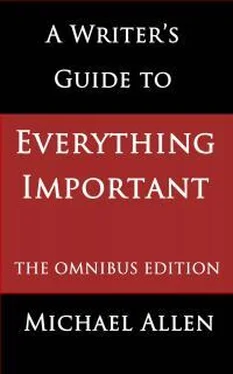Some books continue to produce the intended emotion in readers over a long period of time. There are still plenty of people who can read Jane Austen’s Pride and Prejudice with pleasure, even though it was written in 1813. On the other hand, Fergus Hume’s The Mystery of a Hansom Cab does not satisfy many readers today, despite the fact that it was a huge hit in the years immediately following its publication in 1886.
Books which continue to be enjoyed for long periods of time tend to become known as ‘classics’. This is a convenient shorthand term, but again, you should not be misled into assuming that it implies some absolute quality. Sherlock Holmes is often thought of as ‘immortal’, and James Bond is still going strong at about fifty years of age. But were their creators, Arthur Conan Doyle and Ian Fleming respectively, any better writers than, say, Edgar Wallace or Margery Allingham, neither of whom is much read today? I don’t believe so.
Books which continue to work for a long period of time, say several decades, do so I suspect more by virtue of factors other than the inherent character of the books themselves. Not the least of these is adaptation into film and television series.
As for striving to achieve classic status yourself – forget it. Your first task, when writing a novel, is to make it work for your intended audience today. Let the future take care of itself.
16. I am not more sensitive than you, and I don’t mind admitting it
If there is no hierarchy of books, still less is there a hierarchy of sensitivity when it comes to appreciating and experiencing the emotions which are created by fiction. But there are certainly plenty of people around who think there is.
You would not have to go far, I suspect, in any university department of literature, to find a professor who argued that the genuinely enthusiastic admirer of Ulysses is in some sense a more sensitive person, in terms of her capacity to feel emotion, than is the reader of a confession magazine. But how can such a belief be justified? On what possible grounds can the argument be based?
Is there any evidence to show that the intensity of grief which is experienced on the death of a child varies according to culture, class, age, or education? Does the tribesman in the Amazon rain-forest mourn his dead child any less deeply than the Oxford don? Has anybody done any laboratory work on that? If so, it has escaped my notice.
Work has been done, however (and it was mentioned briefly above), which demonstrates that all human beings who are alive today come from a common stock. Given this circumstance, it is not surprising that Paul Ekman has been able to demonstrate that half a dozen basic emotions are the common experience of all humanity. (Others may well be common too, but that has not yet been demonstrated.)
When it comes to fiction, then, is the emotion which the aesthete feels when reading a ‘recognised masterpiece’ any more intense than the emotion experienced by the reader of a confession magazine?
Take the Girton-educated aristocrat who reads Jane Austen. Is she somehow a more sensitive instrument, capable of registering a broader range or finer gradations of feeling, than is her cleaning-lady when she reads Woman’s Weekly ?
I wouldn’t care to argue that myself. If you cut a magazine reader, does she not bleed?
I have, as it happens, seen some of the correspondence from such ‘low-grade’ readers; specifically, correspondence which was sent to the editorial offices of a confession magazine.
You and I, of course, being sophisticated and educated persons, we understand that confession-magazine stories are (virtually all) fiction, though they may be based on a sliver of truth. But the readers of such stories – considered by some to be semi-literate Untermenschen – take the material seriously. They write in to the magazines, in a pathetic barely joined-up scrawl, to pass on their thoughts on the morality and wisdom of the actions portrayed.
You and I may snigger at these illiterate ramblings. Well, you may, but I wouldn’t, because they embody an intensity of feeling which I find quite humbling. And are you really going to stand up and tell me that the feelings experienced by these readers are somehow less powerful, less subtle, than those which I experience when reading Ulysses ? If so, how are you going to demonstrate this?
Before you even try, perhaps you might care to remember that there was, in the mid-twentieth century, a group of people who did believe that certain classes and races of people were fundamentally inferior to the master race; so inferior, in fact, that the only sensible course of action was to eliminate them from the face of the earth. You may wish to align yourself with that group. I don’t.
My conclusion then is that there is no special virtue in speaking one particular language, and in possessing one particular frame of reference, as distinct from another. We may prefer to have, as our friends, people who share our own interests and tastes, but that’s a different matter entirely.
17. What is a work of art?
This is probably as good a place as any to give you a useful definition of a work of art.
The world is full of pompous prats. Sometimes, when you turn on the telly late at night, it’s quite hard to work out what it is you’re watching. Is it a genuine discussion group, peopled by distinguished academics and critics who are sounding off about ‘art forms’ and the like; or is it French and Saunders sending up the whole thing? It’s sometimes hard to know.
Any one of these late-night TV pundits, whether genuine ‘thinkers’ or satirists, could give you a thirty-minute lecture on what constitutes a work of art, but I shan’t detain you that long.
There exists in London a society called the Royal Society of Arts (RSA). Its full title is ‘The Royal Society for the Encouragement of Arts, Manufactures, and Commerce.’ This is a splendid organisation and I commend it to you; almost anyone of good standing can join.
One of the aims of the RSA, as its name suggests, is to encourage down-to-earth skills which have to do with business – skills which are involved in manufacturing and selling things. The Society gives prizes, for instance, to young designers who show signs of being able to create a better mousetrap.
And this, I think, gives us a pointer to the most useful interpretation of the word ‘arts’. In the RSA context, the word means ‘skills’.
A work of art is therefore a work which has been created through the exercise of skill, rather than by accident. The most common use of the term is in relation to works which have been devised primarily to create emotion, as opposed to works which seek to carry out some function, such as catching mice.
You and I, for instance, can probably not draw a horse. (Well I can’t, anyway.) But there are people around who can, and those people can sensibly be called artists; they are people who possess skills. A painting of a horse is made primarily to impress us with the beauty of the animal; i.e., to arouse emotion.
Artistic skills are normally based on some sort of natural aptitude, which is then developed through training. And one of the big problems about being a writer is, of course, that there is almost nowhere to go to get trained – nowhere sensible, anyway. But that’s a subject for another book.
Applying this working definition of terms such as art, work of art, and artist, will enable you to sort out the nonsense from the worthwhile.
Some years ago, I heard the actor Zero Mostel tell a story about an ‘artist’ in New York. Mostel was genuinely interested in abstract art, and he made it his business to get to know any promising young painter. One day he went to see such a painter at work in his studio.
Читать дальше












